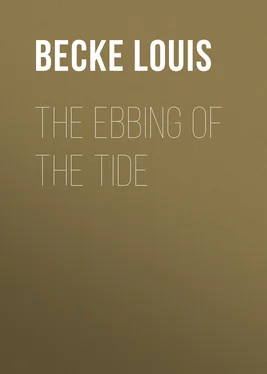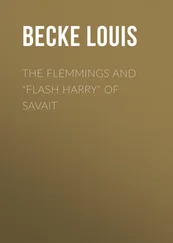Louis Becke - The Ebbing Of The Tide
Здесь есть возможность читать онлайн «Louis Becke - The Ebbing Of The Tide» — ознакомительный отрывок электронной книги совершенно бесплатно, а после прочтения отрывка купить полную версию. В некоторых случаях можно слушать аудио, скачать через торрент в формате fb2 и присутствует краткое содержание. Жанр: foreign_prose, literature_19, foreign_antique, на английском языке. Описание произведения, (предисловие) а так же отзывы посетителей доступны на портале библиотеки ЛибКат.
- Название:The Ebbing Of The Tide
- Автор:
- Жанр:
- Год:неизвестен
- ISBN:нет данных
- Рейтинг книги:5 / 5. Голосов: 1
-
Избранное:Добавить в избранное
- Отзывы:
-
Ваша оценка:
- 100
- 1
- 2
- 3
- 4
- 5
The Ebbing Of The Tide: краткое содержание, описание и аннотация
Предлагаем к чтению аннотацию, описание, краткое содержание или предисловие (зависит от того, что написал сам автор книги «The Ebbing Of The Tide»). Если вы не нашли необходимую информацию о книге — напишите в комментариях, мы постараемся отыскать её.
The Ebbing Of The Tide — читать онлайн ознакомительный отрывок
Ниже представлен текст книги, разбитый по страницам. Система сохранения места последней прочитанной страницы, позволяет с удобством читать онлайн бесплатно книгу «The Ebbing Of The Tide», без необходимости каждый раз заново искать на чём Вы остановились. Поставьте закладку, и сможете в любой момент перейти на страницу, на которой закончили чтение.
Интервал:
Закладка:
She lay back again on the pillow and tried to sleep. Why couldn’t she sleep, she wondered. She closed her eyes. The branches of the pine that grew close to her window rustled and shook to a passing breath of wind, and her eyes opened again. How strangely, though, it sounded to-night, and how her heart was thumping! Again the white lids drooped and half closed again, and the pine branches waved and soughed gently to the breeze.
And then the dead grey of the wall of the room changed to a bright, shimmering white—the white of an island beach as it changes, under the red flush of the morn, from the shadows of the night to a broad belt of gleaming silver—and the sough of the pine-tree by the window deepened into the humming music of the trade-wind when it passes through the sleeping palms, and a million branches awake trembling to its first breaths and shake off in pearly showers the dews of the night. Again she raced along the clinking sand with her childish, half-naked companions, and heard the ceaseless throb of the beating surf upon the windward reef, and saw the flash of gold and scarlet of a flock of parrakeets that with shrill, whistling note, vanished through the groves of cocoa-nuts as they sped mountain wards. Then her latent native soul awoke and made her desperate.
Ere two days had passed she was missing, and six weeks later a little white-painted schooner hove-to off one of the Paumotu Group, lowered a boat, and landed her amongst the wondering natives.
The dark-faced, black-bearded man who steered the boat held her hand a moment ere he said good-bye.
“It is not too late, Loisé.”
She raised her face and laughed scornfully.
“To go back? To go back to hear the old man who was a father and the good woman who was a mother to me, tell me that they hated and despised me!” And then quick, scalding tears.
The man’s face flushed. “No, not that, but,” with an oath, “look here, if you’ll come with me I’ll head the schooner for Tahiti, and as soon as she swings to her anchor we will be ashore and married.”
She shook her head. “Let me go, Captain Lemaire. Whatever comes to me, ‘tis I alone who must answer for it. And so—good-bye.”
She stood and watched the boat hoisted to the davits, and saw the schooner slowly gather way, and then glide past and disappear round the palm-crowned point. Then she turned with streaming eyes and choking voice to the brown-skinned people that stood around her, and spoke to them in her mother’s tongue.
So ended the sixteen years’ life of the beautiful Miss Lambert and began that of Loisé, the half-blood.
There was a wild rush of naked, scurrying feet, and a quick panting of brown bosoms along the winding path that led to Baldwin’s house at Rikitea. A trading schooner had just dropped anchor inside the reef, and the runners, young lads and girls—half-naked, lithe-limbed and handsome—like all the people of the “thousand isles,” wanted to welcome Baldwin the Trader at his own house door.
Two of them—a boy and girl—gained the trader’s gate ahead of their excited companions, and, leaning their backs against the white palings, mocked the rest for their tardiness in the race. With one arm around the girl’s lissom waist, the boy, Maturei, short, thickset, muscular, and the bully of the village, beat off with his left hand those who sought to displace them from the gate; and the girl, thin, créole-faced, with soft, red-lipped mouth, laughed softly at their vexation. Her gaily-coloured grass waist girdle had broken, and presently moving the boy’s protecting arm, she tried to tie the band, and as she tied it she rattled out oaths in English and French at the score of brown hands that sought to prevent her.
“ Hui! Hui!! Away, ye fools, and let me tie my girdle,” she said in the native tongue. “‘Tis no time now for such folly as this; for, see, the boat is lowered from the ship and in a little time the master will be here.”
The merry chatter ceased in an instant and every face turned towards the schooner, and a hundred pair of curious eyes watched. Then, one by one, they sat down and waited; all but the two at the gate, who remained standing, the boy’s arm still wound round the girl’s waist.
The boat was pulling in swiftly now, and the “click-clack” of the rowlocks reached the listening ears of those on shore.
There were two figures in the stern, and presently one stood up, and taking off his hat, waved it towards the shore.
A roar of welcome from the thronging mass of natives that lined the beach drowned the shrill, piping treble of the children round the gate, and told sturdy old Tom Baldwin that he was recognised, and scarce had the bow of the boat ploughed into the soft sand of the beach when he was seized upon and smothered with caresses, the men with good-natured violence thrusting aside the women and forming a body-guard to conduct him and the young man with him from the boat to the house. And about the strange white man the people thronged with inquiring and admiring glances, for he was big and strong-looking—and that to a native mind is better than all else in the world.
With joyous, laughing clamour, the natives pressed around the white men till the gate was reached, and then fell back.
The girl stepped forward, and taking the trader’s hand, bent her forehead to it in token of submission.
“The key of this thy house, Tâmu,” she murmured in the native tongue, as she placed it in his hand.
“Enter thou first, Loisé,” and he waved it away.
A faint smile of pleasure illumined her face; Baldwin, rough and careless as he was, was yet studious to observe native custom.
The white men followed her, and then in the open doorway Baldwin stopped, turned, and raised his hand, palm outwards, to the throng of natives without.
“I thank thee, friends, for thy welcome. Dear to mine ears is the sound of the tongue of the men of Rikitea. See ye this young man here. He is the son of my friend who is now dead—he whom some of ye have seen, Kapeni Paraisi” (Captain Brice).
A tall, broad-shouldered native, with his hair streaming down over his shoulders, strode up the steps, and taking the young man’s hand in his, placed it to his forehead.
“The son of Paraisi is welcome to Rikitea, and to me, the chief of Rikitea.”
There was a murmur of approval; Baldwin waved his hand again, and then, with Brice, entered the house.
Outside, the boy and girl, seated on the verandah steps, talked and waited for orders.
Said Maturei, “Loisé, think you that now Tâmu hath found thee to be faithful to his house and his name that he will marry thee according to the promise made to the priests at Tenararo when he first brought thee here?”
She took a thick coil of her shining black hair and wound it round and round her hand meditatively, looking out absently over the calm waters of the harbour.
“Who knows, Maturei? And I, I care not. Yet do I think it will be so; for what other girl is there here that knoweth his ways, and the ways of the white men as I know them? And this old man is a glutton; and, so that my skill in baking pigeons and making karri and rice fail me not, then am I mistress here.... Maturei, is not the stranger an evil-looking man?”
“Evil-looking!” said the boy, wonderingly; “nay, how canst thou say that of him?”
“What a jolly old fellow he is, and how these people adore him!” thought Brice, as they sat down to dinner. Two or three of the village girls waited upon them, and in the open doorway sat a vision of loveliness, arrayed in yellow muslin, and directing the movements of the girls by almost imperceptible motions of her palm-leaf fan.
Brice was strangely excited. The novelty of the surroundings, the wondrous, bright beauty of sea, and shore, and palm-grove that lay within his range of vision were already beginning to weave their fetal spell upon his susceptible nature. And then, again and again, his glance would fall upon the sweet, oval face and scarlet lips of the girl that sat in the doorway. Who was she? Not old Baldwin’s wife, surely! for had not the old fellow often told him that he was not married?… And what a lovely spot to live in, this Rikitea! By Jove, he would like to stay a year here instead of a few months only.... Again his eyes rested on the figure in the doorway—and then his veins thrilled—Loisé, lazily lifting her long, sweeping lashes had caught his admiring glance.
Читать дальшеИнтервал:
Закладка:
Похожие книги на «The Ebbing Of The Tide»
Представляем Вашему вниманию похожие книги на «The Ebbing Of The Tide» списком для выбора. Мы отобрали схожую по названию и смыслу литературу в надежде предоставить читателям больше вариантов отыскать новые, интересные, ещё непрочитанные произведения.
Обсуждение, отзывы о книге «The Ebbing Of The Tide» и просто собственные мнения читателей. Оставьте ваши комментарии, напишите, что Вы думаете о произведении, его смысле или главных героях. Укажите что конкретно понравилось, а что нет, и почему Вы так считаете.












